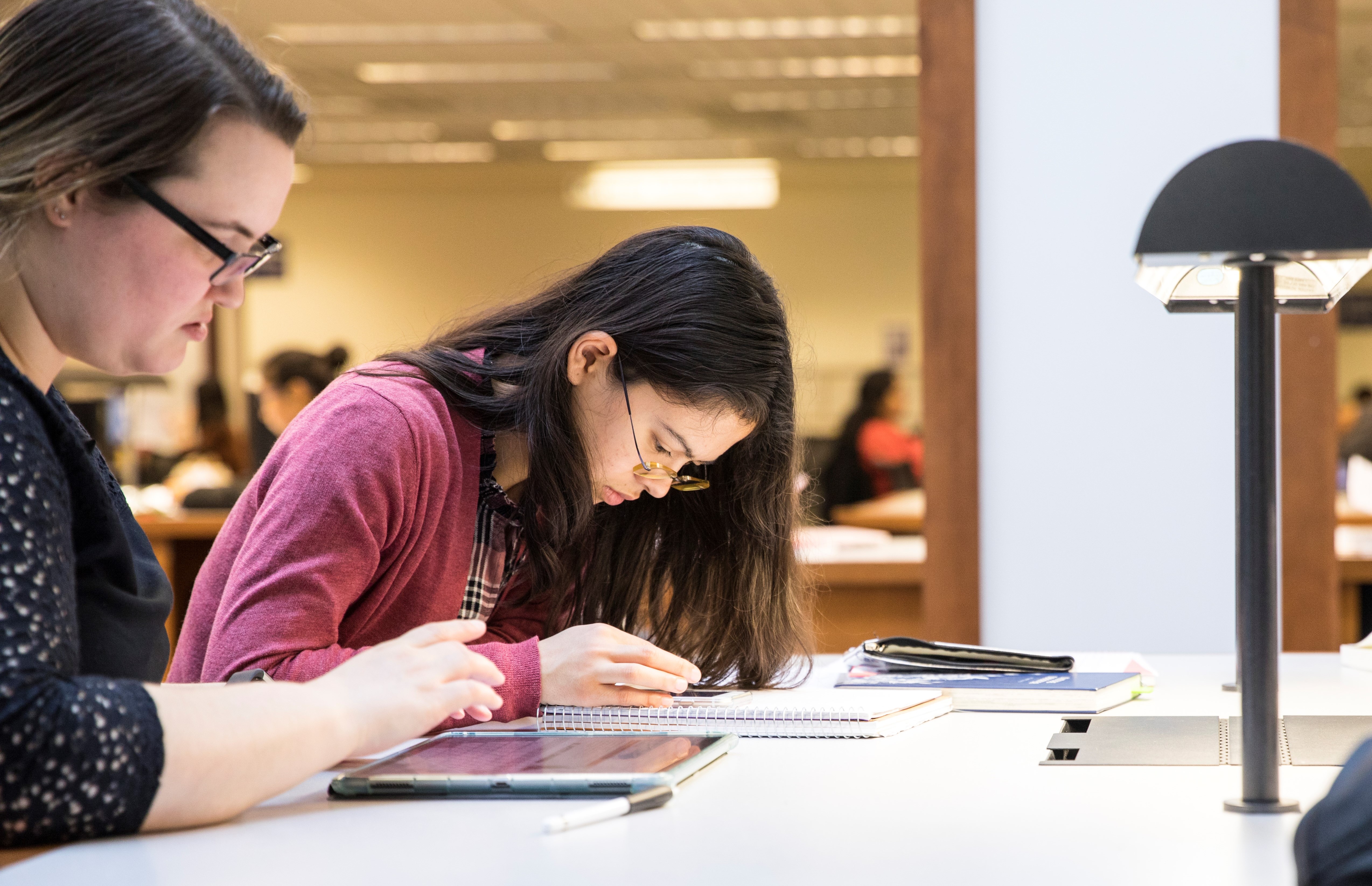
The HAS team acknowledges that university can be challenging for a variety of reasons and we want to give students the academic resources they need to reach their scholarly goals. Use the table below to find links to resources we regularly refer students to.
If you do not see a resource that you are hoping to find, feel free to reach out to us via email, phone, or schedule an appointment for further support.
-
- CLUE tutoring: receive peer support for studying, homework, and exam preparation in a select number of subjects.
- Private coaching: offered through Academic Support Programs, coaching offers students with a one-on-one tutoring environment for support in a select number of subjects.
- CLUE Writing Center: offered through CLUE, this writing center allows students to make one-on-one appointments for in-depth writing feedback.
- Odeegard Writing & Research Center: this center offers tutors for both in-depth writing feedback and information on the research proccess, including how to use the UW library to support student research.
- UW Libraries Study Spaces: learn how to rent a quiet study space for you or a study group.
-
To help students understand the structure and progression of majors and minors in the Humanities, the HAS advising team has created a series of visual roadmaps that can serve as useful tools to help students to plan potential classes beyond their next quarter. These roadmaps also allow students to see clearly up front how many credits a major or minor will take, what courses will fulfil which requirements, and what order these courses can be taken in.
Browse our major and minor roadmaps here.
-
- HAS Transfer Course Evaluation: This form allows for all UW students to request assessment of a transfer course for a UW equivalent and/or to assign it to an Area of Inquiry/General Education requirement. We ask that you only send in course evaluation requests for courses you believe would be taught within one of the 12 Humanities departments.
- Current Quarter Adviser-Assisted Drop Form: This form is for students looking to drop more than one class during the late drop period. Students will need to meet with an adviser as part of the drop process to talk about contingency planning and additional support resources. More instructions on how the current quarter drop process works is available here.
Late Add Petition: This form allows students to request to be added to a course on or after the 8th calendar day of the quarter. All courses added at this time will require a faculty code. There will be a $20 change of registration fee for all registration changes made on a single day during the late add period.
- Former Quarter Drop Form: This form for students looking to drop a course from their transcript which they took in a previous quarter. There is typically a one year time limit on Former Quarter Drop requests. Full instructions on the form submission process are available here.
- Graduation Petition: This petition is a student form that needs to be completed with an adviser in order request a special waiver for a departmental, college, or university graduation requirement. Supporting documentation and/or justifications are typically required for graduation petitions to be considered.
- Returning Student Form: This process allows students who wish to return to the University of Washington after an absence of one quarter or more (excluding summer quarter) by "reactivating" their student status.
- Reinstatement Petition for the College of Arts & Sciences: This process gives College of Arts & Sciences majors who were dismissed from UW for low scholarship the opportunity to return to study at UW. The support of an adviser, a personal statement, and an academic plan are usually required for reinstatement consideration.
-
At UW, there are two ways to engage with Honors programs:
- Interdisciplinary Honors: available to all majors, the Interdisciplinary Honors program challenges students to think expansively and innovatively through offering rigorous interdisciplinary study. Students in this program can expect to develop a community through connecting with fellow Honors students; to engage in research, service, and leadership; and to develop awareness of the interdependency of all branches of knowledge.
- Departmental Honors: Departmental Honors offers students the ability to dive deeply into special projects and collaborate with faculty members within a specific area of study to develop their expertise. Departmental Honors also offers students a cohort-style learning environment that encourages them to deepen relationships with fellow students. Not all departments offer an Honors track; check the department's website to see if they offer an Honors program and see further admissions requirements.
Students not taking specific Honors programs can still graduate from UW with Baccalaureate Academic Honors (Cum Laude, Magna Cum Laude, and Summa Cum Laude). Click here to see GPA requirements per college for Baccalaureate Academic Honors.
-
Independent study provides an in-depth learning experience where a student and faculty member collaboratively create a learning contract specific to the student. Independent studies typically culminate in the creation of a project, paper, or other way of demonstrating knowledge.
The process of taking an independent study course includes:
- 1) Identifying and approaching a faculty member to be your faculty adviser for the study and receiving their permission to lead the study.
- 2) Developing a learning contract with that faculty member that includes learning goals, meeting days/times, required reading, number of credits you will earn, and any other relevant details. Reach out to the department you'd register for the independent study under to see if they have a pre-made contract form you can fill out.
- 3) Send your finalized learning contract to HAS at has-center@uw.edu. Include your faculty member on the chain in case we have follow-up questions. If not already in the form, please also include the quarter you'll be completing this independent study over and your student ID number in the email to HAS.
- 4) HAS will register you if all relevant details are included in your learning contract and/or over email. We'll reach out if we need further information.
-
One of the most common questions we get in our office is about accessing classes and getting add codes, which are primarily an enrollment management tool controlled by faculty. The Time Schedule notes provide the most helpful tool that informs both our students about registration restrictions and instructions for our Humanities courses.
Humanities Academic Services does not manage or distribute add codes at any point in the 3 registration periods for a given quarter. If a student cannot get into a course because it is full, we recommend that students to sign up for notify.UW to receive a text message letting them know that a space has opened up for them to claim. If a faculty member would like a student to have overload permission to add their full course, our office is happy to register the student, but we always request written permission (i.e., a confirmation email) from the instructor before we will do so.
If a student is having technical trouble registering, HAS can help them troubleshoot those issues. If a student mentions they have had technical issues registering for a class with space available where they meet the prerequisites, please refer them to us via has-center@uw.edu. Our advising team's access to the Student Database means we do not require add codes to provide this kind of assistance.
Once the quarter has begun, HAS will not manually register students or give them an add code to access a course without the instructor’s explicit written permission.
-
If a student contacts our office about a grade complaint, we first ask them if they have spoken with the professor about that grade. If they haven’t, we encourage them to do so, if they feel comfortable. We encourage students to approach the professor with a respectful tone and provide as much evidence as they have to support their argument that the grade they received seems incorrect.
We also gently encourage the student to think about the larger picture: are they disputing the grade because they think they have been treated unfairly, or are they just looking to protect their GPA? Will this grade change be critical to satisfactory academic progress at the UW? Will it be critical to their ability to graduate? Have they fully considered their behavior in this course, their actions with the faculty member, the quality of their work? It’s important for students to consider all sides before approaching their faculty member.
If the student is not comfortable talking to a faculty member, we will typically ask them if they want a HAS team member to liaise on their behalf. In order for us to follow up, we'll typically need supporting evidence that a faculty conversation is warranted.
Often the situation is solved after the above steps, but sometimes the student is unsatisfied and the case needs to go to the next level. In smaller departments, we would take the issue to the Chair. In larger departments, there might be an Undergraduate Programs Director or faculty Language Program Coordinator to whom the issue could go before it passes to the Chair.
HAS may be asked to be involved in these subsequent conversations and to help with the actual grade change in the system. Sometimes these meetings are face-to-face meetings; sometimes they happen entirely over e-mail.
In the course of uncovering the reason for a grade dispute, we may occasionally discover that there are allegations of bias. We will outline how we handle those situations in the section below.
-
In cases of alleged bias or abuse, we first support the student, providing resources for their needs. We will refer the student to the Ombud’s office for support, to their OMAD advisor, if they have one, to bias reporting office, the OMA & D office, the Q center, Counseling services at the UW, Health and wellness, or any other support unit on campus that is appropriate for that student in their particular situation.
With the bias case, we ask them for as much information as they can provide (grades, actions in the classroom and outside the classroom, e-mails, correspondence, etc). Support from other students is very helpful in these circumstances, if it is available. But, we will never put the student in question in the position to reach out to their peers if they are uncomfortable or afraid. In most cases, they usually do have corroborating evidence.
We collect all of the information that we can get from the student and take a report to the departmental Chair. The student may want to talk with the Chair along with the written report, and the student may also want an advocate at that meeting with the Chair. Our office will be available to provide whatever support the student needs.
-
Interested in taking a 400-level Creative Writing Workshop? Click here to learn about the registration process.
